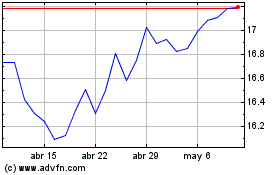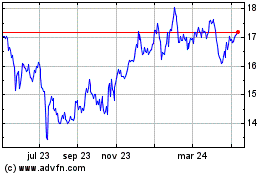By Sarah Krouse
The advent of faster 5G wireless service could be a boon for the
fledgling U.S. mobile sports-betting industry.
In particular, the technology is expected to make it easier for
fans to make wagers during games -- such as whether a quarterback
will complete his next pass, or a basketball player will make free
throws -- as the action unfolds.
The U.S. Supreme Court opened the door to legal sports betting
in the U.S. in 2018 when it struck down federal prohibitions on
such wagering and left it up to states to set their own rules.
Since then New Jersey, along with 11 other states and the District
of Columbia, have legalized sports betting over smartphones,
according to the American Gaming Association.
Now, wireless carriers are rolling out 5G networks in select
U.S. cities, lighting up professional football stadiums and
basketball arenas with the faster service. The technology allows
more devices to be connected at a time and promises to reduce
latency (the amount of time that machines take to respond to each
other), which could keep fans on their phones longer and encourage
more of them to wager while they watch. Outside stadiums, 5G
service could enable fans to make mobile bets while simultaneously
streaming games on their phones.
"Can you pull it off on 4G? Maybe. But can you pull it off on
5G? For sure," Tim Sullivan, chief executive of the New Jersey
Economic Development Authority, says of in-game betting.
Staking a claim
The confluence of 5G and mobile sports betting is expected to
open up new revenue opportunities for sports leagues, gambling
companies and telecommunications firms alike, executives say.
Enhancing today's popular fantasy sports leagues with online
betting, for example, could prompt consumers to spend more time and
money in those apps.
Among the companies making new inroads in this area is New
York-based Verizon Communications Inc., which owns Yahoo Sports, a
provider of sports news, scores and fantasy sports leagues. In
October, Verizon's media unit formed a partnership with casino
giant MGM Resorts International, linking the Yahoo Sports app with
the casino giant's BetMGM platform to allow sports betting.
Scott Butera, president of interactive gaming at MGM, says
fantasy and live-sports content are complementary. "If Tom Brady is
your quarterback this week in fantasy, maybe you will also be
inclined to bet on whether he'll throw two or more touchdown passes
in a game," he says. (The geolocation feature in phones helps
betting apps determine whether consumers are located in states that
allow mobile wagers.)
Faster 5G service will help connect more sensors within stadiums
and bring much lower latency, which translates into more in-game
betting opportunities, says Guru Gowrappan, chief executive officer
of Verizon Media Group.
AT&T Inc. also has taken an interest in the sports-betting
space. Earlier this year the sports-news website Bleacher Report,
part of AT&T's WarnerMedia unit, formed a partnership with
Caesars Entertainment Corp. to produce sports-betting related
content, including videos.
"We don't want to be, you know, running books. That's not our
gig," Randall Stephenson, chief executive of AT&T, said on a
Recode podcast earlier this year. But gambling is critical to the
business AT&T is in, he said.
"There's nothing that changes the fan engagement more than
having something on the line on a game," he said.
Gambling is also slowly making its way into sports venues. Last
month, Monumental Sports & Entertainment, the owner of the
Washington Wizards basketball team, Washington Capitals hockey
team, and Washington Mystics women's basketball team, signed an
agreement with U.K.-based betting company William Hill to open a
sports-betting complex inside the District of Columbia's Capital
One Arena. Monumental said the agreement is the first of its kind
for a professional sports venue in the U.S.
In the U.K., more than 70% of all mobile sports bets are in-play
or after the game has started, while sports betting in the U.S. has
focused primarily on which team will win or lose, says Stephen
Master, president of sports-business advisory firm Master
Consulting.
U.S. sports are well positioned for in-game betting, he says,
because games like baseball and football are less free-flowing than
soccer. Every at-bat, drive or kickoff has an outcome on which to
bet.
But "if in-play betting is really going to take off like it has
overseas, you really need the low-latency, high-speed connectivity"
of 5G, he says.
Challenges remain
Professional sports leagues already are affixing sensors to
players and sports equipment to collect biometric, performance,
speed and velocity measurements.
Zebra Technologies Corp., based in Lincolnshire, Ill., partners
with the NFL to put chips on player uniforms and balls that track
statistics such as player speed and proximity to each other.
To date, that information has been used to help coaches and
players improve performance, but sports-betting executives expect
that data to eventually be piped into fan-wagering platforms. Such
data, for example, would allow consumers to bet on the speed of a
player as he scores a touchdown or how fast a quarterback's pass
was.
Still, fusing 5G service with mobile sports betting may take
some time. U.S. consumers are holding on to their smartphones
longer -- often more than three years -- so the adoption of devices
compatible with 5G service could be slow.
And although carriers began rolling out 5G networks this year in
select cities and some sports arenas, it could take years before
the service is widely available nationwide.
Meanwhile, constant interaction with devices during games could
drain phone batteries, reducing some fans' incentive to engage in
mobile sports betting. And those who want to simultaneously stream
games and bet on them via their phones may need larger screens to
have the best user experience, sports-betting consultants say.
Nevertheless, some states expect the broader adoption of mobile
sports betting to fuel new and existing industries. Behind the fan
placing bets on the Jets or Giants on a Sunday afternoon is
sophisticated wireless-payments and financial-services technology
and regulatory infrastructure, says New Jersey's Mr. Sullivan.
Betting on in-game action requires even faster connectivity and
further investment by the companies that provide those
services.
Ms. Krouse is a reporter for The Wall Street Journal in New
York. Email her at sarah.krouse@wsj.com.
(END) Dow Jones Newswires
November 11, 2019 22:15 ET (03:15 GMT)
Copyright (c) 2019 Dow Jones & Company, Inc.
AT&T (NYSE:T)
Gráfica de Acción Histórica
De Mar 2024 a Abr 2024

AT&T (NYSE:T)
Gráfica de Acción Histórica
De Abr 2023 a Abr 2024
